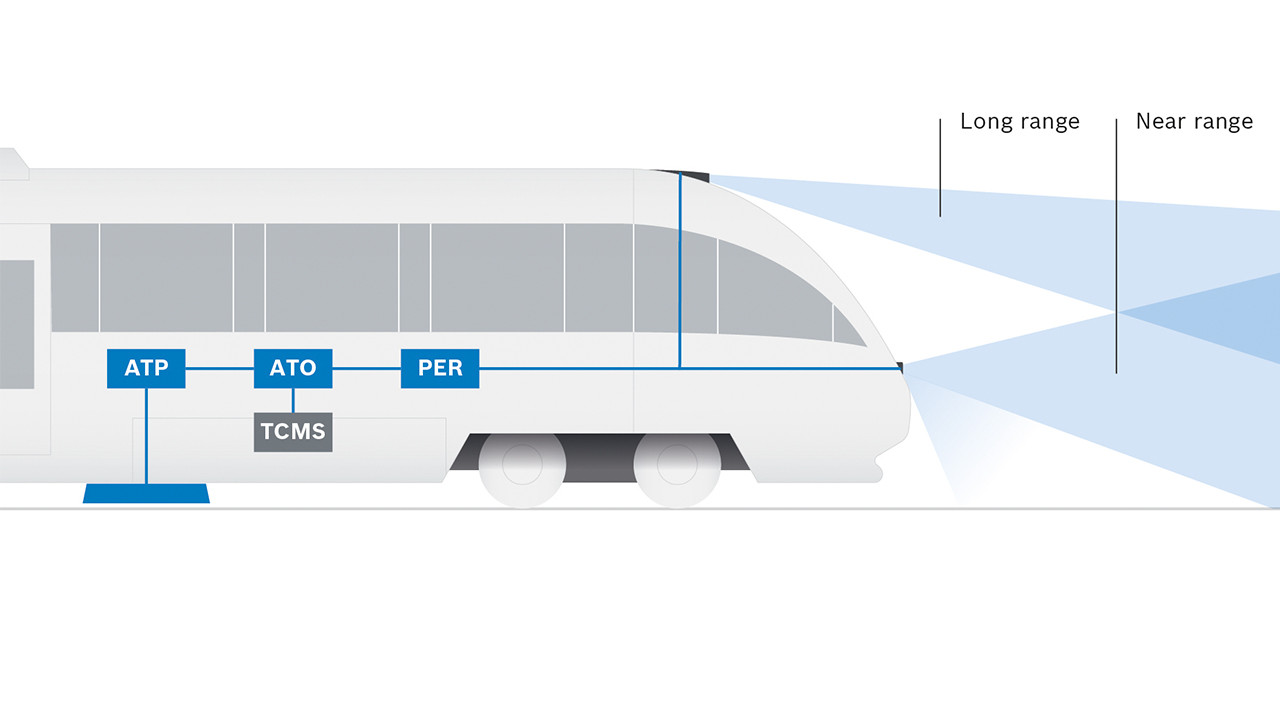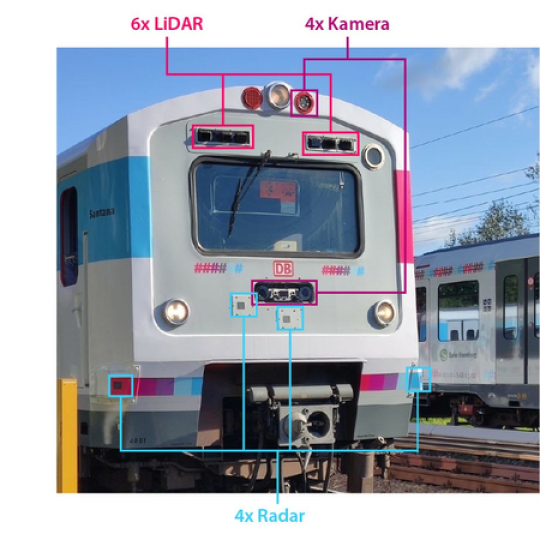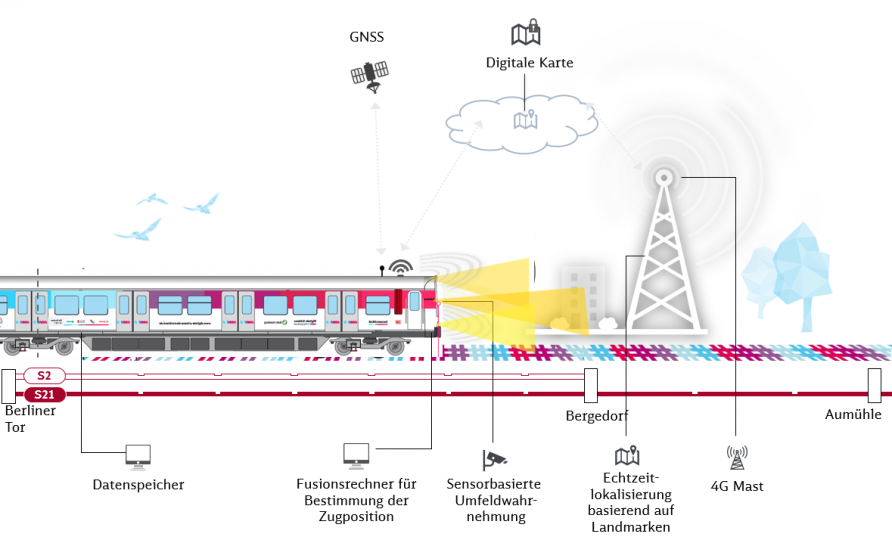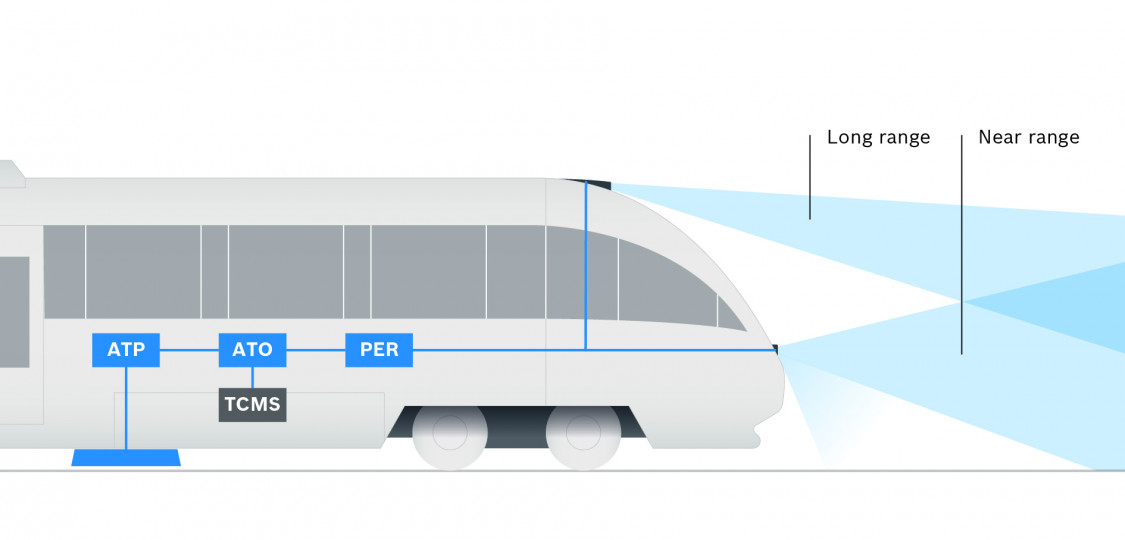Abstatt, Germany – The mobility transformation requires new solutions, and this applies to rail traffic too. To continue to improve the carbon footprint of the mobility sector, both freight and passenger transport by rail must be expanded even further. “Digitalization and automation are the key to attractive transportation by train with more frequent trains, improved availability, and greater punctuality. This allows the capacity of the existing rail network to be expanded considerably without having to lay a single meter of additional tracks,” explains Heiko Mangold, head of the engineering rail technology business field at Bosch Engineering. The long-term vision is fully automated, highly connected, and therefore efficient rail traffic with more frequent passenger and freight trains and high network utilization.
Automation of rail traffic based on tried-and-tested automotive technology
Bosch Engineering has been researching and developing systems and functions for automation of rail traffic for more than ten years. For urban areas, the company offers a collision warning system for city rail transportation as a driver assistance system that supports tram drivers and considerably increases safety in city traffic. For mainline trains, Bosch Engineering is working on much more comprehensive solutions to support automation of driving functions, including normal rail traffic, shunting, and delivering and sorting trains in coach yards. For this purpose, the company also uses its extensive expertise in assistance systems and automation from the automotive sector. The focus of development is on systems for object and signal recognition and methods for object classification that interpret the surroundings of the train and help to prevent accidents during operation. “The next step is then automating train traffic so that the conductor simply monitors operation and only needs to intervene in case of an emergency, all the way to full automation,” says Mangold.
Initial successful concepts implementations with Deutsche Bahn as part of the Sensors4Rail project of Digitale Schiene Deutschland and the Train Autonome –
Service Voyageurs consortium by SNCF confirm the potential of Bosch Engineering’s software and hardware for automation. Work is currently being done to transfer the research and development results into products that are ready for use. Simulations and tests on different route profiles with different train and locomotive series are still to be performed in order to validate and optimize the data obtained.
Driver assistance and collision prevention in domestic tram traffic
Experts from the Bosch Budapest Development Center are also participating in the development of the innovative collision prevention system installed on trams in cooperation with the engineers of Bosch Engineering. "The collision prevention technology of trams has already been proven in real traffic conditions in Debrecen, and we started testing this year in Budapest as well. The camera and the radar sensor, which form the basis of the system, are manufactured in Hungary, at the site of Bosch company group in the city of Hatvan" emphasized Dr. István Szászi, Representative of Bosch Group in Hungary and the Adriatic region.
Further information:
Sensors4Rail – Digitale Schiene Deutschland
https://digitale-schiene-deutschland.de/en/Sensors4Rail
Train Autonome – Service Voyageurs de SNCF
https://www.sncf.com/en/innovation-development/innovation-research/driverless-trains-to-run-in-2023
Zita Hella Varga
Phone: +36 70 667-6374
About Bosch Engineering GmbH
Bosch Engineering GmbH is a wholly owned subsidiary of Robert Bosch GmbH and is head-quartered in Abstatt, Germany. As a systems development partner to the automotive industry since 1999, the company with its more than 3,000 associates offers development services for powertrains, safety and convenience systems, and electrical and electronic systems – from the original concept to series production. Specialized in electronics and software, it draws on Bosch’s proven large-scale series production technology to develop tailored solutions for a wide variety of applications in passenger cars, commercial vehicles, off-highway and recreational vehicles, and in rail applications, ships, and industry. Bosch Engineering GmbH also coordinates all the Bosch Group’s motorsports activities.
Additional information can be accessed at www.bosch-engineering.com .
Mobility Solutions
Mobility Solutions is the largest Bosch Group business sector. It generated sales of 45.3 billion euros in 2021, and thus contributed 58 percent of total sales from operations. This makes the Bosch Group one of the leading automotive suppliers. The Mobility Solutions business sector pursues a vision of mobility that is safe, sustainable, and exciting, and combines the group’s expertise in the domains of personalization, automation, electrification, and connectivity. For its customers, the outcome is integrated mobility solutions. The business sector’s main areas of activity are injection technology and powertrain peripherals for internal-combustion engines, diverse solutions for powertrain electrification, vehicle safety systems, driver-assistance and automated functions, technology for user-friendly infotainment as well as vehicle-to-vehicle and vehicle-to-infrastructure communication, repair-shop concepts, and technology and services for the automotive aftermarket. Bosch is synonymous with important automotive innovations, such as electronic engine management, the ESP anti-skid system, and common-rail diesel technology.
Bosch has been present in Hungary since 1898 with its products. After its re-establishment as a regional trading company in 1991, Bosch has grown into one of Hungary’s largest foreign industrial employers with currently eight subsidiaries. In fiscal 2021 it had total net sales of 1,711 billion forints and consolidated sales to third parties on the Hungarian market of 273 billion forints. The Bosch Group in Hungary employs more than 17,000 associates (as of December 31, 2021). In addition to its manufacturing, commercial and development business, Bosch has a network of sales and service operations that covers the entire country.
The Bosch Group is a leading global supplier of technology and services. It employs roughly 402,600 associates worldwide (as of December 31, 2021). The company generated sales of 78.7 billion euros in 2021. Its operations are divided into four business sectors: Mobility Solutions, Industrial Technology, Consumer Goods, and Energy and Building Technology. As a leading IoT provider, Bosch offers innovative solutions for smart homes, Industry 4.0, and connected mobility. Bosch is pursuing a vision of mobility that is sustainable, safe, and exciting. It uses its expertise in sensor technology, software, and services, as well as its own IoT cloud, to offer its customers connected, cross-domain solutions from a single source. The Bosch Group’s strategic objective is to facilitate connected living with products and solutions that either contain artificial intelligence (AI) or have been developed or manufactured with its help. Bosch improves quality of life worldwide with products and services that are innovative and spark enthusiasm. In short, Bosch creates technology that is “Invented for life.” The Bosch Group comprises Robert Bosch GmbH and its roughly 440 subsidiary and regional companies in some 60 countries. Including sales and service partners, Bosch’s global manufacturing, engineering, and sales network covers nearly every country in the world. With its more than 400 locations worldwide, the Bosch Group has been carbon neutral since the first quarter of 2020. The basis for the company’s future growth is its innovative strength. At 128 locations across the globe, Bosch employs some 76,100 associates in research and development, of which more than 38,000 are software engineers.
Additional information is available online at www.bosch.hu, iot.boschblog.hu, www.bosch.com, www.iot.bosch.com, www.bosch-press.com, http://www.twitter.com/BoschPress.







